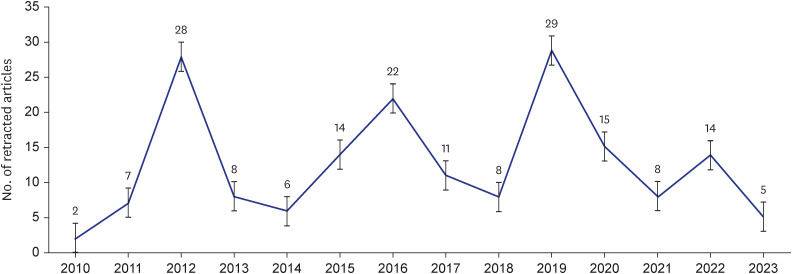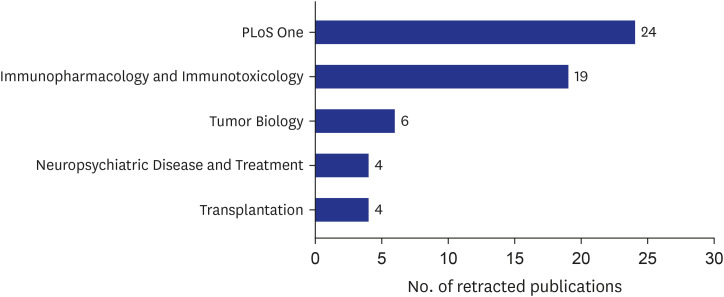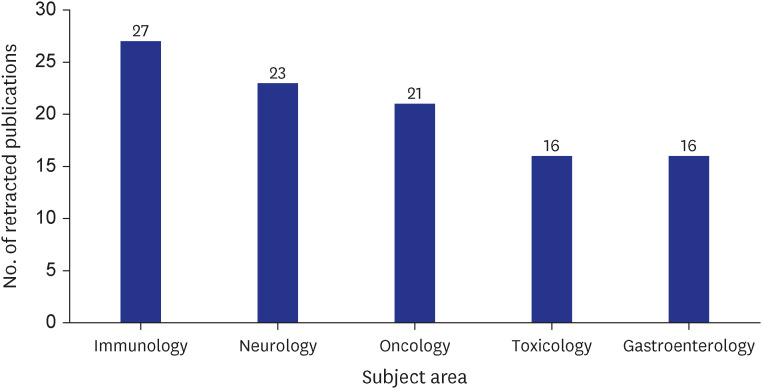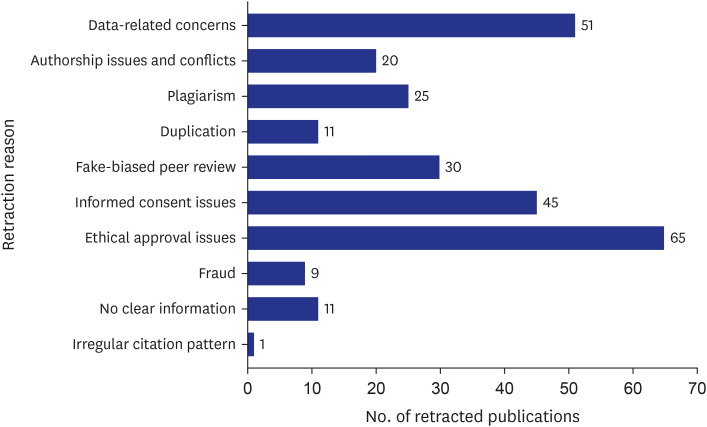J Korean Med Sci.
2023 Oct;38(40):e324. 10.3346/jkms.2023.38.e324.
Analysis of Retracted Publications in Medical Literature Due to Ethical Violations
- Affiliations
-
- 1Department of Physical Medicine and Rehabilitation, Faculty of Medicine, Kahramanmaraş Sütçü İmam University, Kahramanmaraş, Türkiye
- 2Physiotherapy and Rehabilitation Application and Research Center, Hasan Kalyoncu University, Gaziantep, Türkiye
- 3Department of Scientific and Clinical Work, Doctoral and Master’s Studies, South Kazakhstan Medical Academy, Shymkent, Kazakhstan
- 4Department of Biology and Biochemistry, South Kazakhstan Medical Academy, Shymkent, Kazakhstan
- KMID: 2546932
- DOI: http://doi.org/10.3346/jkms.2023.38.e324
Abstract
- Background
Retraction is an essential procedure for correcting scientific literature and informing readers about articles containing significant errors or omissions. Ethical violations are one of the significant triggers of the retraction process. The objective of this study was to evaluate the characteristics of retracted articles in the medical literature due to ethical violations.
Methods
The Retraction Watch Database was utilized for this descriptive study. The ‘ethical violations’ and ‘medicine’ options were chosen. The date range was 2010 to 2023. The collected data included the number of authors, the date of publication and retraction, the journal of publication, the indexing status of the journal, the country of the corresponding author, the subject area of the article, and the particular retraction reasons.
Results
A total of 177 articles were analyzed. The most retractions were detected in 2019 (n = 29) and 2012 (n = 28). The median time period between the articles’ first publication date and the date of retraction was 647 (0–4,295) days. The leading countries were China (n = 47), USA (n = 25), South Korea (n = 23), Iran (n = 14), and India (n = 12). The main causes of retraction were ethical approval issues (n = 65), data-related concerns (n = 51), informed consent issues (n = 45), and fake-biased peer review (n = 30).
Conclusion
Unethical behavior is one of the most significant obstacles to scientific advancement. Obtaining appropriate ethics committee approvals and informed consent forms is crucial in ensuring the ethical conduct of medical research. It is the responsibility of journal editors to ensure that raw data is controlled and peer review processes are conducted effectively. It is essential to educate young researchers on unethical practices and the negative outcomes that may result from them.
Keyword
Figure
Reference
-
1. Zimba O, Gasparyan AY. Plagiarism detection and prevention: a primer for researchers. Reumatologia. 2021; 59(3):132–137. PMID: 34538939.2. Mehta P, Mukherjee S. Plagiarism and its repercussions: a primer on responsible scientific writing. Cent Asian J Med Hypotheses Ethics. 2022; 3(1):52–62.3. Rahman H, Ankier S. Dishonesty and research misconduct within the medical profession. BMC Med Ethics. 2020; 21(1):22. PMID: 32183809.4. Deculllier E, Maisonneuve H. Correcting the literature: improvement trends seen in contents of retraction notices. BMC Res Notes. 2018; 11(1):490. PMID: 30016985.5. Kleinert S. Committee on Publication Ethics (COPE). COPE’s retraction guidelines. Lancet. 2009; 374(9705):1876–1877. PMID: 19962558.6. Kocyigit BF, Akyol A. Analysis of retracted publications in the biomedical literature from Turkey. J Korean Med Sci. 2022; 37(18):e142. PMID: 35535370.7. Carlisle JB. Data fabrication and other reasons for non-random sampling in 5087 randomised, controlled trials in anaesthetic and general medical journals. Anaesthesia. 2017; 72(8):944–952. PMID: 28580651.8. Nair S, Yean C, Yoo J, Leff J, Delphin E, Adams DC. Reasons for article retraction in anesthesiology: a comprehensive analysis. Can J Anaesth. 2020; 67(1):57–63. PMID: 31617069.9. Gupta L, Gasparyan AY, Misra DP, Agarwal V, Zimba O, Yessirkepov M. Information and misinformation on COVID-19: a cross-sectional survey study. J Korean Med Sci. 2020; 35(27):e256. PMID: 32657090.10. Moylan EC, Kowalczuk MK. Why articles are retracted: a retrospective cross-sectional study of retraction notices at BioMed Central. BMJ Open. 2016; 6(11):e012047.11. Stavale R, Ferreira GI, Galvão JA, Zicker F, Novaes MR, Oliveira CM, et al. Research misconduct in health and life sciences research: a systematic review of retracted literature from Brazilian institutions. PLoS One. 2019; 14(4):e0214272. PMID: 30986211.12. Gupta L, Tariq J, Yessirkepov M, Zimba O, Misra DP, Agarwal V, et al. Plagiarism in non-anglophone countries: a cross-sectional survey of researchers and journal editors. J Korean Med Sci. 2021; 36(39):e247. PMID: 34636502.13. Rapani A, Lombardi T, Berton F, Del Lupo V, Di Lenarda R, Stacchi C. Retracted publications and their citation in dental literature: a systematic review. Clin Exp Dent Res. 2020; 6(4):383–390. PMID: 32233020.14. Wang T, Xing QR, Wang H, Chen W. Retracted publications in the biomedical literature from open access journals. Sci Eng Ethics. 2019; 25(3):855–868. PMID: 29516389.15. Brainard J. Rethinking retractions. Science. 2018; 362(6413):390–393. PMID: 30361352.16. Chauvin A, De Villelongue C, Pateron D, Yordanov Y. A systematic review of retracted publications in emergency medicine. Eur J Emerg Med. 2019; 26(1):19–23. PMID: 28825929.17. Brown SJ, Bakker CJ, Theis-Mahon NR. Retracted publications in pharmacy systematic reviews. J Med Libr Assoc. 2022; 110(1):47–55. PMID: 35210962.18. King EG, Oransky I, Sachs TE, Farber A, Flynn DB, Abritis A, et al. Analysis of retracted articles in the surgical literature. Am J Surg. 2018; 216(5):851–855. PMID: 29229380.19. Tang L, Hu G, Sui Y, Yang Y, Cao C. Retraction: the “other face” of research collaboration? Sci Eng Ethics. 2020; 26(3):1681–1708. PMID: 32215814.20. Cassão BD, Herbella FA, Schlottmann F, Patti MG. Retracted articles in surgery journals. What are surgeons doing wrong? Surgery. 2018; 163(6):1201–1206. PMID: 29525734.21. Rivera H, Teixeira da Silva JA. Retractions, fake peer reviews, and paper mills. J Korean Med Sci. 2021; 36(24):e165. PMID: 34155837.22. Gholampour B, Gholampour S, Noruzi A, Arsenault C, Haertlé T, Saboury AA. Retracted articles in oncology in the last three decades: frequency, reasons, and themes. Scientometrics. 2022; 127(4):1841–1865.23. Hong ST. Plagiarism continues to affect scholarly journals. J Korean Med Sci. 2017; 32(2):183–185. PMID: 28049227.24. Gasparyan AY, Ayvazyan L, Akazhanov NA, Kitas GD. Self-correction in biomedical publications and the scientific impact. Croat Med J. 2014; 55(1):61–72. PMID: 24577829.25. Wang B, Lai J, Yan X, Jin F, Yao C. Exploring the characteristics, global distribution and reasons for retraction of published articles involving human research participants: a literature survey. Eur J Intern Med. 2020; 78:145–146. PMID: 32216996.26. Bozzo A, Bali K, Evaniew N, Ghert M. Retractions in cancer research: a systematic survey. Res Integr Peer Rev. 2017; 2(1):5. PMID: 29451549.27. Gasparyan AY, Nurmashev B, Seksenbayev B, Trukhachev VI, Kostyukova EI, Kitas GD. Plagiarism in the context of education and evolving detection strategies. J Korean Med Sci. 2017; 32(8):1220–1227. PMID: 28665055.28. Teixeira da Silva JA. Fake peer reviews, fake identities, fake accounts, fake data: beware! AME Med J. 2017; 2(3):28.29. Gasparyan AY, Nurmashev B, Voronov AA, Gerasimov AN, Koroleva AM, Kitas GD. The Pressure to Publish More and the Scope of Predatory Publishing Activities. J Korean Med Sci. 2016; 31(12):1874–1878. PMID: 27822923.30. Gasparyan AY, Gerasimov AN, Voronov AA, Kitas GD. Rewarding peer reviewers: maintaining the integrity of science communication. J Korean Med Sci. 2015; 30(4):360–364. PMID: 25829801.
- Full Text Links
- Actions
-
Cited
- CITED
-
- Close
- Share
- Similar articles
-
- Characteristics of Retracted Publications From Kazakhstan: An Analysis Using the Retraction Watch Database
- Analysis of Retracted Publications in The Biomedical Literature from Turkey
- Plagiarism
- Sexual Boundary Violation between Psychiatrist and Patient
- Relation Between Adjacent Superior Segmental Disease and Facet Joint Violations After Posterolateral Lumbar Fusion






